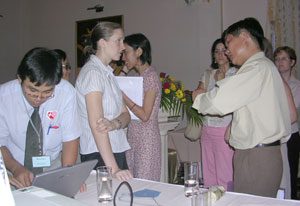Life’s Challenges: Overcoming Mental Struggles Through Therapy
Feeling lost and overwhelmed by life’s difficulties? Remaining silent, suppressing emotions, or erupting into violence… Psychologists refer to this as a mental struggle. Fortunately, today’s psychotherapy can help you address these mental issues.
With the advancement of psychotherapy, individuals no longer need to bottle up their feelings amidst the frustrations of daily life, as there are specialists available to help with mental health concerns.
The field dedicated to treating mental struggles is known as “Psychotherapy.”
However, psychotherapy is still in its infancy in Vietnam.
Psychotherapy: Addressing Mental Struggles
 |
| Psychologists gathering to find ways to enhance the field of psychotherapy. |
X, a 16-year-old girl, appears to be an exemplary student and a well-behaved child. She lives in a large family that includes her grandmother, parents, uncle, aunt, younger brother, and cousin. Among her relatives, X is the only one who has completed secondary school and excels academically. Despite the love and support she receives at home, she has little social interaction outside her immediate family.
What seemed trivial turned out to be complicated… Suddenly, X began experiencing symptoms like sadness, apathy, and loss of appetite. These symptoms worsened to the point where she struggled to focus on her studies. Whenever she tried to study, she would suffer from headaches and nausea. Concerned, her family took her to a psychiatric clinic and then to the Individual & Family Counseling (IFC) center.
At IFC, X received counseling and psychological therapy once a week. Here, professionals utilized their skills under the guidance of Libby Zinman-Schwartz, an American psychologist currently training counselors at IFC, to diagnose and identify X’s issues.
Through trustworthy communication with her counselor, X gradually revealed her true feelings. It became clear that being labeled as a “well-behaved child and good student” meant she was often held up as a role model for her cousin. Consequently, whenever her cousin was scolded, X felt guilty. Moreover, due to excessive care and attention from her family, X felt an overwhelming sense of responsibility to please everyone, leading to self-imposed pressure.
Alongside this inner turmoil, X found herself in a contradiction: she did not want to grow up, fearing that as an adult, she would no longer receive the love she currently enjoys…
Psychological Therapy: A New Approach to Mental Struggles
Cases like X’s are not uncommon… Another girl, 26 years old, initially came to IFC feeling stressed due to her colleagues at work.
However, through numerous therapy sessions, she uncovered deep-seated issues from her past (having suffered sexual abuse as a child). After therapy, she found the courage and confidence to confront the challenges in her life.
 |
| Psychologists discussing at the First Psychotherapy Workshop in Ho Chi Minh City. |
Fortunately, both X and the other girl found the right “treatment”… That is, “psychotherapy” conducted by skilled professionals in the field.
According to Ngo Minh Uy from the IFC counseling office, “Counseling and psychotherapy should not be mistaken for giving advice or teaching someone with mental struggles. The important thing is to help individuals recognize their true selves and express their realities. Through professional exercises under the guidance of psychologists, those with mental struggles gradually change their perspectives, accept the realities they face, and confidently confront their circumstances…”
However, the crucial question remains: how can X express her true feelings? According to Huỳnh Thị Hoài Như from the IFC counseling office, this is a very challenging issue that requires the necessary professional skills of a psychologist.
To uplift those suffering from mental struggles (or “clients,” as referred to by psychotherapy specialists), strict time management is enforced during each counseling session. For example, after agreeing on a 30-minute session, clients are expected not to arrive late. If they are late, the time lost is deducted from their session. This policy encourages clients to take responsibility throughout the therapy process. Additionally, it helps them develop habits of managing their lives rather than succumbing to feelings of despair.
A key difference in how psychotherapy is conducted at IFC compared to many other counseling centers is that counselors do not solve their clients’ problems for them. Instead, they help “uncover” issues through psychological methods so clients can work through their challenges themselves.
Libby Zinman-Schwartz, who has studied psychotherapy for years, observes: “In the West, a healthy individual is one who can safely express all their emotions. However, in Vietnam, there is a different perspective on this issue.”
Psychotherapy: Just the Beginning
|
Currently, our psychological-educational science exists primarily as a theoretical field, heavily academic in nature. Consequently, it has not yet fully realized its practical applications, which remain weak. (Recommendation from the Vietnam Union of Science and Technology Associations to the National Assembly in May 2005) |
Agreeing with Libby, Dr. Đinh Phương Duy from the Ho Chi Minh City Educational Psychology Association comments: Recently, there has been a growing demand for psychological therapy. Particularly in real life, we do not have the habit of expressing emotions. Sometimes we want to keep certain feelings to ourselves, fearing that speaking out will lead to judgment or criticism…
Meanwhile, Professor Dr. Trần Tuấn Lộ, head of the Psychology Department at Van Hien University, confirms the reality that schools, hospitals, and companies all need psychological therapy specialists. However, this area remains largely unaddressed. As a result, more students are contemplating suicide, and workers in companies are showing signs of “burnout”…
Yet, the pressing question remains: where can those with mental struggles seek help? This continues to be a significant concern for professionals in the field of psychology.
 |
|
Libby at the Psychotherapy Workshop. |
Without hesitation, Dr. Đinh Phương Duy emphasizes the stark reality: “The field of psychotherapy in Vietnam, particularly in Ho Chi Minh City, is virtually non-existent. In terms of personnel, qualified individuals can be counted on one hand. Only a few have been trained abroad. We are at the very beginning stage, and people are just starting to recognize the need for psychotherapy and the public’s desire to express their feelings. We are forming a new habit that enables people to express their emotions and seek professional help to resolve their psychological challenges.”
– Dr. Đinh Phương Duy adds that most specialists in Vietnam are equipped with theoretical knowledge from Russian schools and some other countries but lack practical training in therapy.
Recently, some experts have been making efforts to enter this field. Although they are not formally trained, they are exploring, researching various literature, and experimenting to apply it in real life. Currently, a few places have begun to experiment with psychotherapy, but it is still limited…
For the most part, counseling centers today primarily offer advice, merely providing suggestions to those with mental struggles without implementing actual psychotherapy!
The field of psychotherapy in our country is lagging behind societal development. There are numerous pressures that lead individuals to experience mental distress. Reasons include work pressure, changing moral standards, but people are unable to adapt in time, resulting in feelings of being lost and causing psychological shocks. Without the implementation of psychological therapy, individuals with mental struggles find it challenging to regain psychological balance. This can lead to negative consequences for society, affecting public order and safety.
Currently, in Ho Chi Minh City, there are over 20 psychological counseling centers. While they are passionate, they still lack a unified approach in terms of skills and direction. Only the International Foundation for Counseling (IFC) is actively providing psychological therapy. However, according to Dr. Dinh Phuong Duy: “IFC is just the initial phase; the specialists at IFC are still experimenting with psychological therapy under the guidance of foreign experts…”
Nong Khac Y – Doan Truc


















































